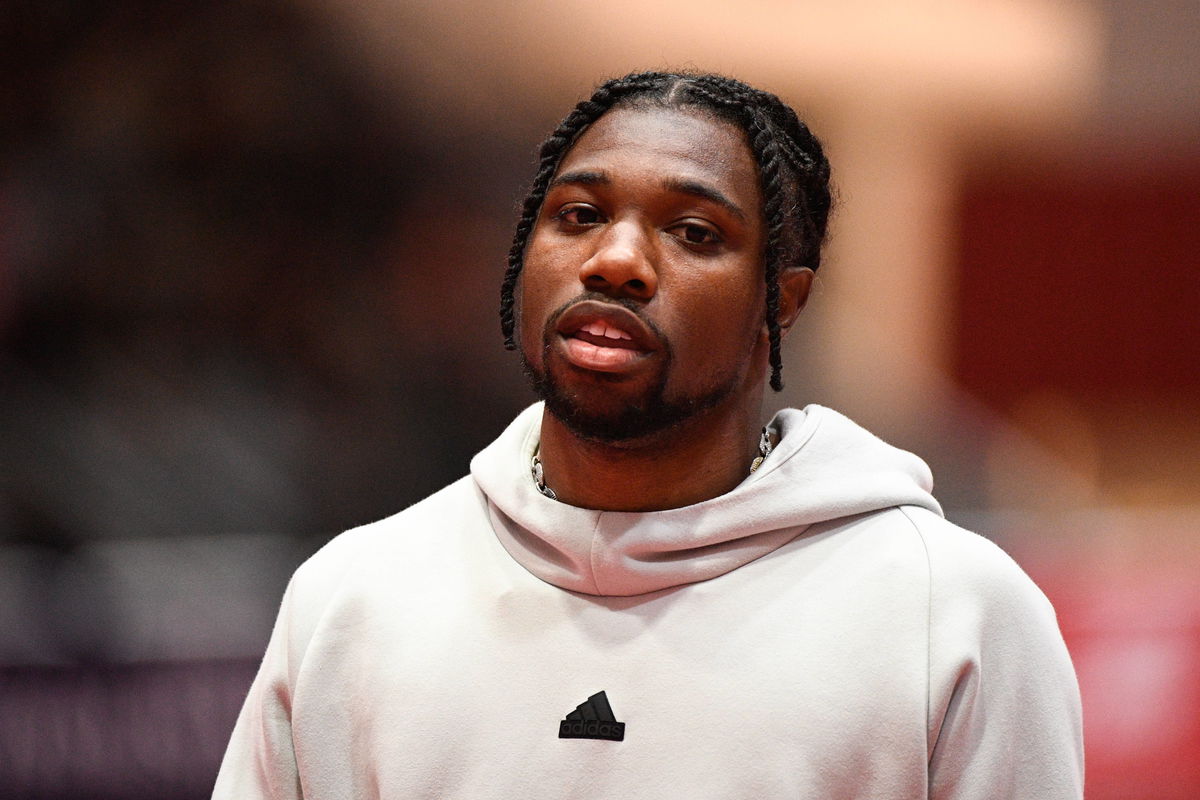
Imago
BOSTON, MA – FEBRUARY 02: Noah Lyles of the United States looks on during warmups before the mens 60m in the New Balance Indoor Grand Prix on February 2, 2025, at the TRACK at new balance in Boston, MA. Photo by Erica Denhoff/Icon Sportswire TRACK & FIELD: FEB 02 New Balance Indoor Grand Prix EDITORIAL USE ONLY Icon25020299

Imago
BOSTON, MA – FEBRUARY 02: Noah Lyles of the United States looks on during warmups before the mens 60m in the New Balance Indoor Grand Prix on February 2, 2025, at the TRACK at new balance in Boston, MA. Photo by Erica Denhoff/Icon Sportswire TRACK & FIELD: FEB 02 New Balance Indoor Grand Prix EDITORIAL USE ONLY Icon25020299
In the past, track and field athletes shifted allegiances with discretion, their motives often buried under paperwork and platitudes. In 2025, however, the motives are not only visible. They are jarringly loud. Four Olympic medallists from Jamaica, still basking in the glow of their recent successes, have filed for nationality transfers. The destination is not one of the traditional powerhouses. It is Turkey. And while social media noise often distorts the gravity of such moves, this moment warrants close, dispassionate scrutiny. Why, at the height of their careers, are so many top-tier athletes exchanging national colors?
Watch What’s Trending Now!
The reasoning is rarely mysterious once the money is counted. As Anderson Emerole explained on his Final Leg Track & Field podcast from June 23, these switches are not driven by sentiment but by structure. Or lack thereof. “It’s really important here,” he remarked, “Her frustration with the Nigerian Athletics Federation… Favour Ofili has actually spoken about [this] very frequently over the past couple years.” Ofili, though born and trained in Nigeria, found herself mired in a system that repeatedly undermined her potential. Missed competition entries. Delayed payments. Years lost not to injury, but to indifference. Turkey’s offer, a reported package approaching US$1 million in financial and infrastructural support, did not mesmerize her. It provided her with the much-needed stability.
And Ofili is not alone. Emerole’s commentary draws attention to an even more striking case. Jamaica. He names them in a measured tone. Regina Campbell, Olympic bronze medalist in the shot put; Ro Stona, last year’s gold medalist in the discus; Wayne Pinnock, a long jump silver medalist; and Jaydon Hibbert, fourth in the Olympic triple jump. All four, once considered cornerstones of Jamaica’s future, are now in the process of finalizing their switch to Turkey. As a group, they are young, accomplished, and financially aware. “They said some of these incentives: an upfront payment of at least $500,000 US per athlete,” Emerole added, noting additional performance bonuses that would stretch into the hundreds of thousands. This is not relocation. It is professional recalibration.
ADVERTISEMENT
The silent comparison hanging over these moves is, inevitably, the United States. American athletes, despite operating under a better-resourced system, have long voiced concern over uneven sponsorship, limited national support, and the grind of chasing bonuses with little guarantee. Noah Lyles, the reigning sprint star, has hinted at the loneliness of that pursuit. Unlike their Jamaican and Nigerian peers, many U.S. athletes do not face outright neglect. But they do navigate a highly individualistic and often isolating economic model. The Turkish model, while controversial, provides immediate clarity. Structured investment, guaranteed starts, and a framework that, if nothing else, respects the athlete’s calendar and career lifespan.

Imago
IMAGO
For Turkey, with the 2028 Olympics approaching, building a competitive delegation through selective recruitment is a calculated national strategy. And while questions around sporting identity, national pride, and global regulation persist, they are unlikely to slow the exodus. For the athletes, the calculus is direct. Medals win glory, but stability buys longevity. As the traditional track powers look on, perhaps wondering when and how the drift began, one must ask a more uncomfortable question. How many more must leave before federations begin to listen?
ADVERTISEMENT
At the heart of it all remains a disquieting paradox. The sport’s most talented individuals, trained in nations with storied histories, now seek relevance and fairness outside their borders. If Turkey has chosen to value them at the level their accomplishments suggest, the real issue is not the country doing the poaching. It is the countries letting them go. And who better than athletes would reflect on the financial situation of athletics?
ADVERTISEMENT
Track and field stars demand pay justice as Olympic dreams clash with real-world struggles
The financial skeleton of track and field is cracking, and athletes are no longer staying silent. Noah Lyles recently chose not to participate in the Grand Slam Track league, and when he finally spoke out, his criticism went far beyond one canceled event. “That’s never good to hear,” he said of the league’s collapse. “That means that you weren’t able to make it the first full year, full season, accomplishing all the goals that you had planned.” What concerned Lyles more than the failed ambition was the absence of real infrastructure, a system where even $30 million in investment couldn’t build a lasting foundation. “That’s very saddening,” he added. “Because that doesn’t just affect the league, Grand Slam, but it affects every other athlete that might have leagues in their head in the future.” For Lyles and many others, the sport isn’t short on talent—it’s short on structure and sustainability.

ADVERTISEMENT
That message is being echoed by Olympians across the board. Bermudian long jumper Tyrone Smith, who jumped a world lead in 2017, recalled heading straight from the runway to his day job. “I remember jumping a world lead in 2017 and promptly going to the dealership to sell a car with sand still on me,” he said, revisiting his dual life as an elite athlete and car salesman. Similarly, Chelsea Hayes, who jumped 7.10m to make the 2012 Olympic team, revealed, “…I was working 3 jobs after making an Olympic Team.” Such stories strike a common nerve; greatness on the field is not matched by financial recognition off it. Even a sarcastic video from athlete and track enthusiast Erin Brown, poking fun at world-class runners working low-paying jobs, sparked an avalanche of serious commentary. “Ts not funny but it’s so funny… pay these athletes man!” wrote 3x NCAA All-American Katelyn Hutchison, while former world record holder Leroy Burrell fumed, “Just because one CALLS one’s self a pro track athlete doesn’t mean one IS a pro track athlete.”
Top Stories
Sean McDermott Announces Bad News for Josh Allen as Bills QB Rings Alarm Bells

NFL Legend Terrell Owens, Terry Bradshaw’s Wife & More Share Messages After ICE Shooting Controversy

‘NASCAR on Sale?’: France Family’s $5B Empire in Talks to Get Sold Just Weeks After Losing Lawsuit

Veteran NFL Announcer Al Michaels Makes Decision on Retirement

Jeff Gordon Distances Himself From NASCAR Fans to Defend Steve Phelps With 6-Word Statement

Novak Djokovic Faces Roadblock as He Won’t Be Able to Represent Serbia After Australian Open

The stories continue to pour in. Kyree King, silver medalist at the 2022 NACAC Championships, recently exposed an eight-month wait for a mere $2,000 payment. “It’s gotta stop… Eight months for 2 bands… not weeks but 8 f*****g months…” he posted. The frustration extends to the sport’s biggest names, too. Sha’Carri Richardson reportedly withdrew from her season opener in Miramar last year amid disputes over appearance fees. Months earlier, she had accused fundraising efforts of missing their mark, stating, “The money donated by common men does not at all reach the athletes in need.” These aren’t isolated rants—they are urgent signals from a sport fighting to keep its stars afloat. And while the $50,000 Olympic gold medal prize announced by World Athletics is a step, athletes like Lyles are demanding more than temporary fixes. They’re asking for a system that doesn’t rely on improvisation and sacrifice to survive.
ADVERTISEMENT
ADVERTISEMENT
ADVERTISEMENT
ADVERTISEMENT

